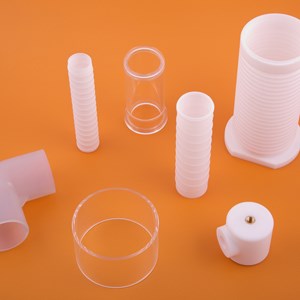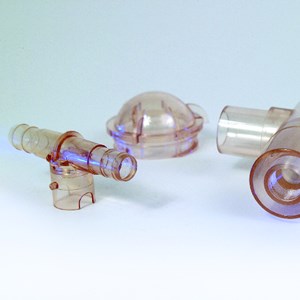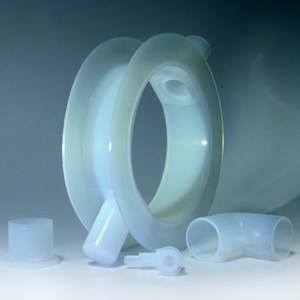Solutions
Moulded Components
Moulded Components
Utilising our extensive injection moulding, compression moulding and transfer moulding facilities we convert the widest range of melt fluoropolymers and advanced engineering thermoplastics into precision component parts. In addition, complex PTFE components are produced by isostatic and automatic moulding processes.
Our high quality products are supplied for some of the world’s most prestigious projects and used across many business areas including chemical, medical, fluid handling and aerospace.
Our moulding technologies are enhanced by first class technical support.
Injection Moulding
This manufacturing technique for making parts is one of the most common methods of production. The molten plastic is injected at high pressure into a mould that is the inverse of the shape of the product.
Our wide range of specially modified injection moulding machines provides the capabilities to manufacture a wide variety of custom components from thermoplastics and fluoropolymers including PFA, FEP, PCTFE, PEEK, ETFE, ECTFE, PES, PAI PPS, LCP, TPE (Thermoplastic elastomers) Nylon, Acetal.
Optimised for cost and reliability, our facilities mould complex shapes in high volume production and/or one-off bespoke parts for a specific application. Using our unique tooling system we can supply samples and prototypes prior to production.
Machine Modification
- Special barrels and screws to prevent machine corrosion when processing fluoropolymers
- Special heaters to allow proving of materials with temperatures in excess of 400°C
- Desiccant dryers to remove all traces of moisture from normal and hygroscopic moulding
- High-temperature oil heaters for better control and ensures moulds are heated and maintained at the correct temperature
Capabilities
- Insert and Over moulding (moulding to another material e.g. metal)
- Semi-finished Near Shape moulding
- Moulding machine capacity: 25-220 tonne clamp force
- Shot weights: 0.5gram - 500 gram
- Ability to process materials in excess of 400°C
- Post Moulding
We can offer the following service
- Ultrasonic welding
- Machining
- Assembling
- Printing
Isostatic Moulding
Isostatic moulding, originally developed for the manufacture of ceramics, can provide the solution to enable intricate and contoured shapes to be produced with little or no machining. We have the ability to produce high quality, large and complex shapes in PTFE which, to date; have been virtually impossible to produce other than by extensive machining and fabrication.
The Isostatic process is ideally suited for repetitive batch manufacture of PTFE components and both insert and outsert moulding to combine the corrosion resistance of the PTFE with the strength of metal.
There are two types of processes; dry bag and wet bag and both methods incorporate the cold compaction of PTFE at high pressure, followed by sintering at temperatures of around 400ºC (752ºF).
DRY BAG
This process is normally carried out using a mould in a hydraulic press.
Advantages
- Dramatic savings on material usage
- High Quality PTFE Grade A Type 1
- Repeatability
- High out-put compared with wet bag moulding and compression moulding
- More intricate shapes
- Cleaner process
WET BAG
The process involves a flexible elastomeric mould which is pressurised within a hydrostatic pressure chamber.
Advantages
- Large sizes
- Longer lengths with the same pressure throughout the billet
- Cost-effective tooling
TYPICAL ISOSTATIC PRODUCTS
Corrosion Industry
- Pipe & column liners (up to 600mm dia)
- Pipe fittings (tees, elbows & reducers
- Nozzles and dip pipes
- Valve liners (diaphragm)
- Bellows
- Pump liners (centrifugal, screw)
- Impellers, agitators and mixer paddles
Electrical Industry
- High voltage insulators
Medical & Semiconductor Industries
- Tanks & containers













